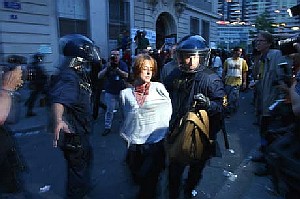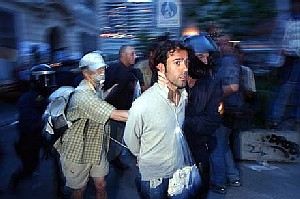Police Raid Targets Media Activists and l'Usine Cultural Centre During the G8.
http://geneva03.org/moin.cgi/FirstAccount
 Just before nine o'clock on Sunday June 1st, l'Usine — a cultural center and space for anti-g8 communications production in Geneva-- was raided by police. For several days l'Usine had also been the home to the Geneva03 live-stream project (http://www.geneva03.org) that has provided continuous live coverage of the wide range of demonstrations, discussions and points of view, which have constituted the opposition to the G8 Summit.
Just before nine o'clock on Sunday June 1st, l'Usine — a cultural center and space for anti-g8 communications production in Geneva-- was raided by police. For several days l'Usine had also been the home to the Geneva03 live-stream project (http://www.geneva03.org) that has provided continuous live coverage of the wide range of demonstrations, discussions and points of view, which have constituted the opposition to the G8 Summit.
The police made their first overt appearance at l'Usine in late afternoon. Riots were taking place several hundred meters away. Police closed off access on the streets around the bridge nearby. From about 7.30 onwards two groups of police occupied the streets leading to Place des Volontaires from the direction of the bridge 'Coulouvroniere'. They remained there and people were able to pass by them in small groups. At this time there were several hundred people on the square talking and drinking. In an effort to maintain calm, workers from the Usine brought down a large amount of food to the square and people sat down and began to eat.
 Shortly before nine o'clock several vans arrived at high speed on the Rue de la Coulouvroniere outside of l'Usine and unleashed groups of plain clothes police officers, indistinguishable from demonstrators except for pink armbands marked 'police'. They moved immediately to enter l'Usine from the main entrance on the Place des Volontaires. Workers from l'Usine and others from the square attempted to block their entry by forming a human chain before the door and appealed to them to enter into dialogue, calling for calm and the avoidance of violence. The leader of the police squadron paused briefly and turned as if he had decided that they should leave, but almost immediately returned with more men, who proceeded to attack the people protecting the door. Armed with telescopic batons and concussion grenades, they pushed and then beat those at the door, ignoring any attempts at negotiation. As people scrambled to escape in the panic, riot police attacked again, hitting people with long batons. One independent video journalist was hit and injured during this attack and then arrested.
Shortly before nine o'clock several vans arrived at high speed on the Rue de la Coulouvroniere outside of l'Usine and unleashed groups of plain clothes police officers, indistinguishable from demonstrators except for pink armbands marked 'police'. They moved immediately to enter l'Usine from the main entrance on the Place des Volontaires. Workers from l'Usine and others from the square attempted to block their entry by forming a human chain before the door and appealed to them to enter into dialogue, calling for calm and the avoidance of violence. The leader of the police squadron paused briefly and turned as if he had decided that they should leave, but almost immediately returned with more men, who proceeded to attack the people protecting the door. Armed with telescopic batons and concussion grenades, they pushed and then beat those at the door, ignoring any attempts at negotiation. As people scrambled to escape in the panic, riot police attacked again, hitting people with long batons. One independent video journalist was hit and injured during this attack and then arrested.
Police then entered the first floor of l'Usine and began to hunt people in the building, smashing windows and doors of every type throughout. Activists were subdued, handcuffed, or sent into hiding. Police then set to work on the inner doors, cheering and shouting, eventually breaking through into the back sections of the building. This section hosts the Geneva03 streaming project which continued to cover the raid live including the moment of the police eruption into the studio itself. Police battered at the door inside the Zoo section of L'Usine for about fifteen to twenty minutes, while activists were besieged in the media room. There, workers from Indymedia, Mute, Candida, Everyone Is An Expert, Lora Radio and other groups struggled to remain calm. The fact that police could be heard shouting and smashing things, made this difficult. A significant number of those present, especially from the Italian contingent, had also been present in Genoa at the raid of the media centre there. The stream was taken down temporarily as activists rushed to save equipment, but is now up and running again at
The activists were soon split into two groups and searched. Their personal effects were laid on the floor in front of them. These effects were then examined by the same 'black bloc' style police, who were by now peaceable and made all efforts to appear reasonable and controlled. Passports were examined and taken. The police phoned a source to check each passport. Eleven people were arrested in the whole Usine complex — for purposes of 'verifying their identity'-- all of whom were later released.
After much consideration, orders 'from high up' came and the media activists were told that they could go about their work. All passports were returned. Contrary to early statements by the police, no tapes were taken. There is footage from inside the building from at least four cameras.
Why l'Usine?
In order to justify the brutal and unjustified invasion of l'Usine, politicians and police have alleged that building constitutes the center for the groups blamed for the destruction which has occurred in Geneva in recent days. The pretext for the raid thus was the supposed presence of 'casseurs' inside the complex. In fact the only people present inside were a handful of people in the public access internet space, workers from l'Usine, independent video-journalist teams and the participants in the Geneva03 project. This was basically conceded by the police officer who led the raid; their original intention had been to shut the building, but as their search produced no finds of either people or material involved in the disturbances, the order for closure was rescinded.
Throughout the week Geneva03 has operated with transparency to both the Swiss authorities, demonstrators and the public in general. Its live coverage that is accessible by anyone with an internet connection. The police were clearly aware of the stream, since upon entering the studio they immediately demanded it be turned off and that microphones be removed.
There are significant parallels between the raid conducted at l'Usine in Geneva and that against the Independent Media Center in Genoa in July 2001. In Genoa, the same association of independent media with so-called 'black block' factions was used to justify the destruction of legal materials relating to complaints against the police and video materials substantiating a series of abuses. The Genoa and Geneva events can be situated as moments in the ongoing attempt by the police, press and other Establishment forces to associate independent media with violent, illegal protest. The objective of these operations is the criminalization of independent media able to give voice to dissent and demand accountability over police conduct. In the face of widespread opposition to the policies and systems of rule advanced by meetings such as the G8, such a tactic is increasingly necessary to the authorities and its repetition signals that it now forms part of a normalized modus operandi. Freedom of expression and information have suffered once again the force of police repression.
And Afterwards
Ironically Geneva is to be the location of the first part of the World Summit on the Information Society in December this year organised by the United Nations. The summit co-host, Tunisia, has already flagged its engagement with the issues by arresting and imprisoning web activist Zouhair Yahyaoui, editor of online journal TUNeZINE and ardent critic of Tunisia's human rights record. In April, Yahyaoui began a second hunger strike in jail. With this vicious attack on independent communications Geneva has the 'privilege' of joining the list of countries in the world where expression is suppressed through authoritarian methods.